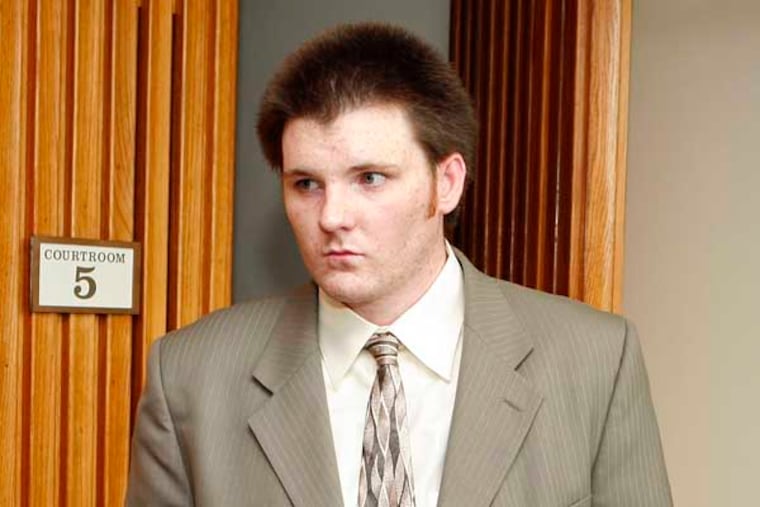Garrett Reid had steroids in room when he died
THE MUSCLES that Garrett Reid packed on before he died of an overdose at Eagles training camp in August may have been a facade, it seems, like his sobriety.

THE MUSCLES that Garrett Reid packed on before he died of an overdose at Eagles training camp in August may have been a facade, it seems, like his sobriety.
Authorities in Northampton County said Monday that the 19 vials of liquid found in Reid's dorm room at Lehigh University after his death Aug. 5 contained four types of anabolic steroids used mostly by bodybuilders.
Reid, 29, was volunteering as a strength-and-conditioning coach with the team, coached by his father, during training camp over the summer. Authorities discovered 47 syringes and 64 needles in a nylon bag in his dorm room, but Northampton County District Attorney John Morganelli said there was no evidence that Reid was selling the steroids or giving them to anyone else.
Northampton County Coroner Zachary Lysek said more testing was being done to determine whether the steroids were in Reid's system when he died of a heroin overdose in his room. Otherwise, he said, no other physical evidence existed to determine whether Reid was using the steroids as well.
"At this point, I can't draw any conclusions," Lysek said Monday at his office.
At the time of his death, reporters and players noted that Garrett Reid had changed physically in the years that followed his struggles with drug addiction. Weightlifting and "supplements" had become a passion.
"He acted like a bodybuilder almost, was always flexing in the mirror, would tell you what the best protein was," linebacker Casey Matthews told the Inquirer at the time of Reid's death. "He was kind of like a meat head."
Morganelli said that neither the NFL nor the Philadelphia Eagles had reached out to his office in the wake of the findings. Coach Andy Reid, in a statement, said Monday's report just confirmed the troubles Garrett had "encountered in the final years of his life," but he dispelled any link between steroids and his team.
"I am confident that my son's decisions did not affect our football team in any way," Reid said.
All four steroids found in his son's room are among those the NFL looks for when testing players. One of the steroids, testosterone propionate, usually is prescribed to men who don't produce enough testosterone on their own, Morganelli said, but is used recreationally to bulk up muscles. It must be injected every two to three days, Morganelli added.
Testing also found boldenone undecylenate, a steroid often used in the "off-season" because it stays in the system longer, Morganelli added. It also is used to add mass and muscle and must be injected every three to four weeks. The third steroid, nandrolone phenyl propionate, once was "very expensive and hard to get," Morganelli said, and is long-acting. It is limited to bodybuilders, he added.
The final steroid found in laboratory testing was trenbolone acetate, a "strong" anabolic steroid that Morganelli said "builds up mass and makes you strong in a shorter amount of time." It often is combined with other steroids for better effects, he said.
Morganelli said the vials were unlabeled and contained small liquid amounts that ranged anywhere from three to 10 milliliters. Those amounts could have been for personal use or distribution. A 10-milliliter vial, for instance, might last a single user about two weeks, experts say.
The NFL requires all players to be tested at least once a year for prohibited substances as part of the preseason physical at training camp or whenever a player reports to a team.
Each week during the preseason and regular season, 10 players on every team are tested at random. Periodic testing continues in the playoffs for active teams. During the off-season, players under contract may be tested up to six times.
The NFL had little to say about Monday's report.
"We are aware of the information and will follow up as appropriate," said NFL spokesman Greg Aiello. He declined to elaborate.
No Eagles players have been suspended this year for violating the league's steroid or substance-abuse policies, and no member of the team has been suspended for a banned substance since Joselio Hanson in 2009.
It is unclear whether Reid was taking the steroids, but both Lysek and Morganelli said the discovery does not change his cause of death: Reid died of an accidental heroin overdose. Authorities found two empty wax-paper packets typically used to package heroin in his room.
The investigation, Morganelli said, mainly focused on where and how Reid obtained the heroin. Investigators scoured through Reid's cellphone records and found that much of his contact was with friends and relatives. Reid had met a female acquaintance in the Lehigh Valley two weeks before his death, Morganelli said. That woman had contacted him within 24 hours of his death, and had tried to contact him via calls and text messages in the hours after he died, but Morganelli said there was no evidence connecting her with Reid's supply of heroin or steroids.
Lehigh University has ended its investigation, and Morganelli said his office no longer would investigate the source of Reid's heroin or steroids, or whether he was distributing either one - "unless there's something new," he said after Monday's brief news conference in Easton.